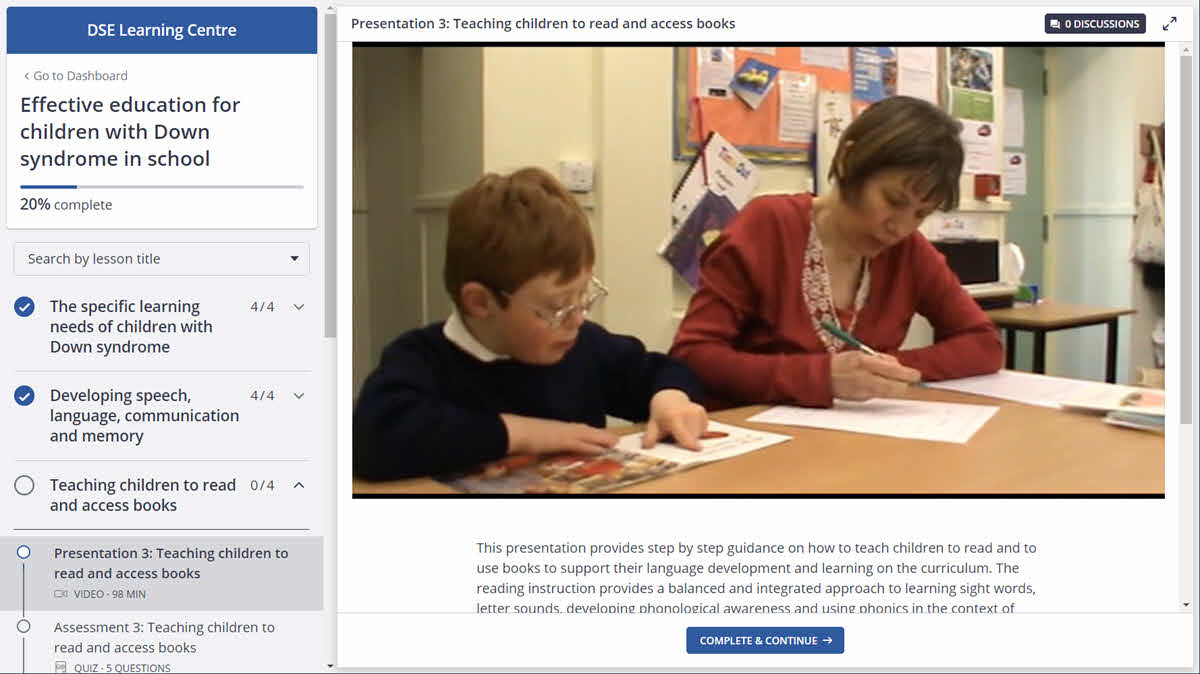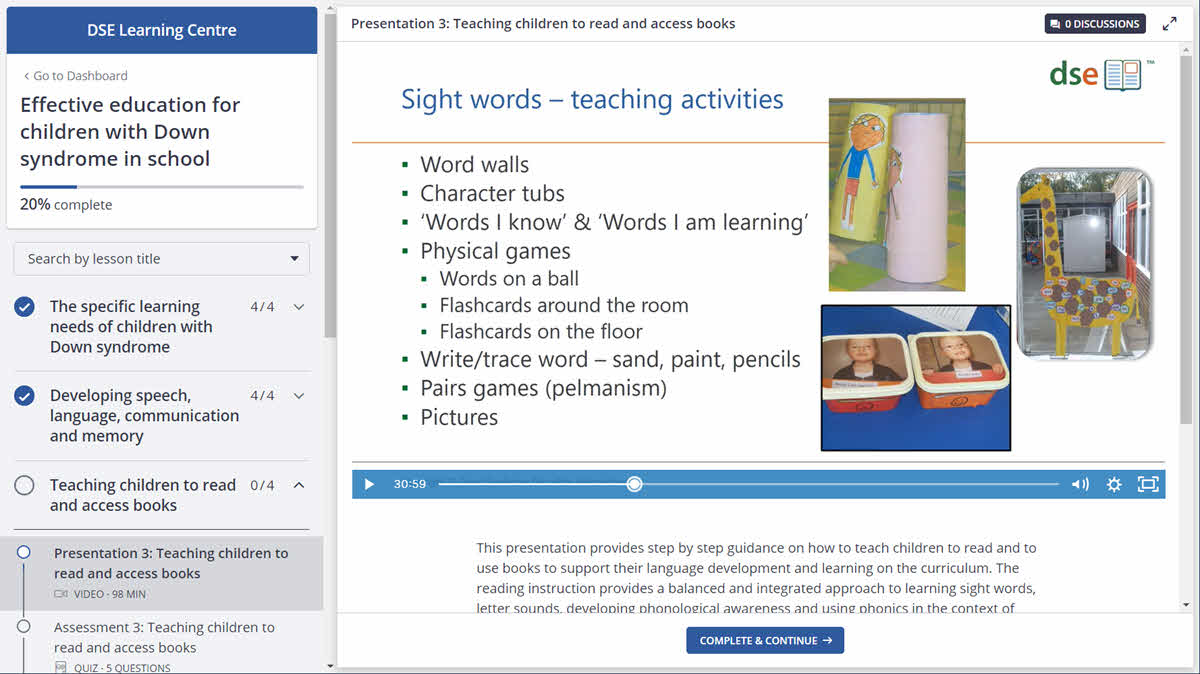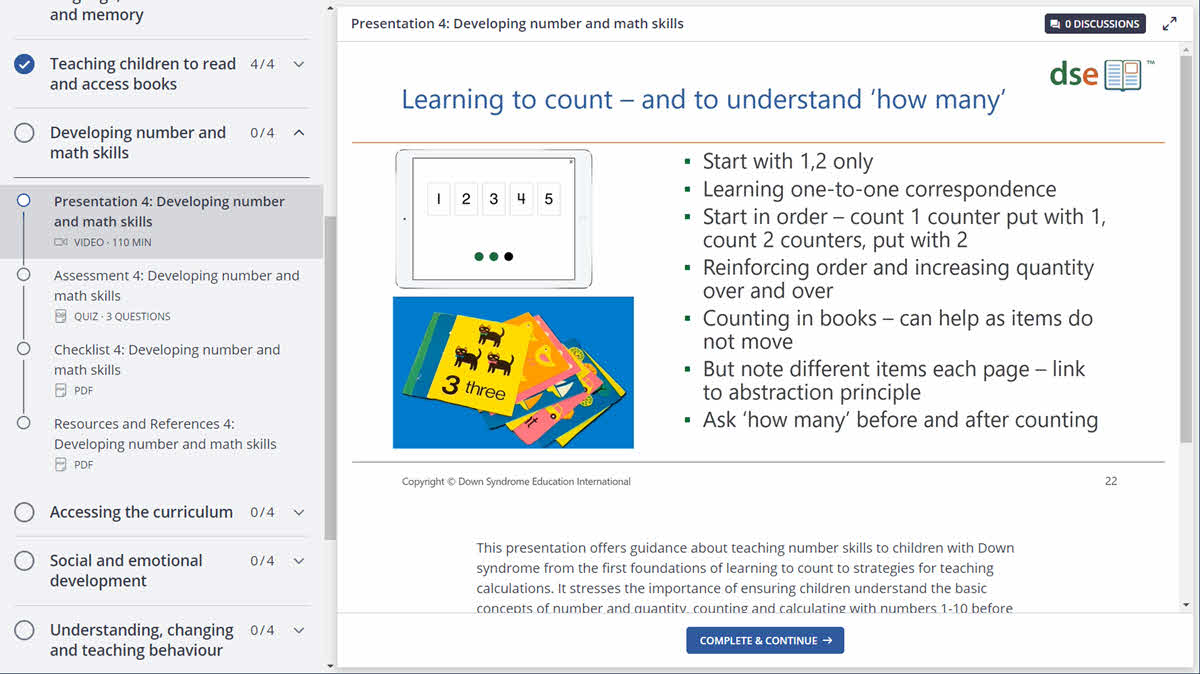Online course: Effective education for children with Down syndrome in school
This online course provides detailed and evidence-based information and guidance on education for children with Down syndrome. The course offers educators and parents practical advice on effective strategies for supporting learning across the curriculum and facilitating successful inclusion.
On this page:
Children with Down syndrome experience specific learning difficulties and require additional, targeted support in the classroom. Over the past 40 years, research has helped us to better understand these difficulties and how best to adapt teaching for young people with Down syndrome. Presented and led by Professor Sue Buckley OBE, this course details what the latest research tells us about learning and development for children with Down syndrome and how this can inform more successful education in school.
This online course offers convenient training and support for educators working with children with Down syndrome aged from 4 to 16 years, including teachers and assistants, speech and language therapists, advisory teachers, educational psychologists and outreach/advice staff and volunteers at organisations supporting young people with Down syndrome. The course is also valuable for parents seeking guidance on how to support their child in school.
The course includes 10 modules, each of which includes a video presentation, handouts and an assessment. The video presentations can be viewed, handouts downloaded and assessments completed at any time. In addition, course participants can contact DSE tutors to ask questions and seek additional advice. Course participants should plan to spend a minimum of 20 hours studying to complete the course and assessments.
The course is accessible to participants in any country. A computer with a modern web browser and a reliable Internet connection sufficient for streaming videos is required.

"I have now completed the course. What a wonderful, worthwhile experience, I have so enjoyed it! I have found it has given me so much important and useful information that I can use everyday."
Contents
The following modules are included in this course:
- The specific learning needs of children with Down syndrome - implications for educators - what is known about the effects of Down syndrome on learning and development, the nature and significance of the children's specific difficulties, the practical implications for education strategies across the curriculum and evidence that these adaptations are effective for improving children's progress
- Developing speech, language, communication and memory - guidance and practical activities to develop children's vocabulary, sentences and grammar, communication and speech clarity - and ways to improve aspects of memory important for learning
- Teaching children to read and access books - guidance on how to teach children with Down syndrome to read and to use books to support their language development and learning across the curriculum - using a balanced and integrated approach to learning sight words, letter sounds, developing phonological awareness and using phonics in the context of successful book reading from the start
- Developing number and maths skills - teaching number skills from the first foundations of learning to count to strategies for teaching calculations
- Accessing the curriculum - describes how to plan teaching and learning to take account of the learning strengths and needs of children with Down syndrome - provides practical strategies which can be applied across the curriculum - considers ways to set targets and record progress
- Social and emotional development for all including children with additional needs and/or autism - discusses ways to develop children's ability to relate to and communicate effectively with others, to make friends, to learn the social rules and be fully socially included in school and community, to build self-confidence and a positive self-identity through school years - considers ways to meet the social and learning needs of children with additional diagnoses including ASD, ADHD, OCD and those with more significant cognitive delays
- Understanding, changing and teaching behaviour - practical guidance on how to change behaviours that are challenging or are interfering with a child's learning and social inclusion - stresses the importance of a consistent team approach for success and includes a number of example plans for commonly occurring behaviours
- Developing movement abilities, sports, leisure and independence skills - considers how motor skills develop and ways in which motor abilities influence children's learning in the classroom, play and social inclusion during break times and in physical education and progress with self-help and practical daily independence
- Evidence for the benefits of inclusion in education and the keys to success - provides an overview of the research into the effects of inclusive versus special education placements on the educational, language and social progress of children with Down syndrome
- Families, partnerships and a shared vision - considers the importance of partnerships with parents and the ways in which teachers and parents can work together to achieve the best outcomes for children

"I really find this course well structured, informative and very useful. I am glad that I took it."
"the high quality information included gives an overview of high quality practice for all young people with SEND and not just for young people with Down syndrome."

"I wish to express my huge gratitude to Sue and all involved in compiling and presenting this wonderful course. As a former primary teacher I had a little knowledge but due to this course I feel I can contribute greatly to my wonderful seven year old grandson... Many, many thanks."
"Thoroughly enjoyed all ten modules. They all were full of interesting information with a great balance of research and real life stories. Sue is an amazing presenter and her positive attitude towards our expectations for people with Down Syndrome really has rubbed off. I hope I will always think about the rights of children, young people and adults to have an ordinary life. As a speech-language therapist it has been great to gain a broader understanding of the issues facing these children and young people and their families."
Features
This course features:
- Video presentations - lasting between one and two hours, available to course participants for streaming on-demand
- Handouts - download copies of the slides in the presentation to work through
- Assessments - check your learning with online assessments
- 'In practice' checklists - guidance and checklists to assist course participants to identify how to apply what they have learned for each child that they work with
- Further reading, references and resources - references to research discussed in each module, together with further reading and recommended resources are provided for those wishing to develop their knowledge further
- Certificates of achievement - certificates for participants who successfully complete each module and assessment in this course
Course duration
We recommend setting aside around two hours per week for 10 weeks to study this course.
Access to the course is available as a monthly subscription or a single purchase of 12 months.
Participants must successfully complete each module and all assessments to receive a certificate of achievement.
How to book
You can purchase access to our online courses via our subscriptions website .
Help with online courses and subscriptions
Please visit our support site for additional help with online courses and subscriptions.

"The information contained in your class is exactly the type of information Speech Language Pathologists are looking for... Thank you again for a wonderful course."
"Many thanks for such an awesome, well presented, very informative course. All 10 modules have been very interesting and delivered in a most positive and professional manner by Sue. There was a great balance of research and real life stories bringing an in-depth meaning to the reality of Down syndrome. I have broadened my knowledge immensely and feel I have a far greater understanding to take with me in my work as an Early Intervention Teacher with families and colleagues. The resources and references will continue to provide ongoing learning and support for myself, preschools and schools that I am involved with. I would definitely recommend this course to others."

